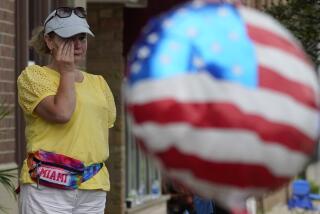Police Redeployed as Homicides Rise Sharply in New York City
- Share via
NEW YORK — There were eight killings last weekend. Eleven more from Monday through Friday. Suddenly, homicide rates are way up in the nation’s largest city, where outgoing Mayor Rudolph W. Giuliani has long made stamping out crime a cornerstone of his political success.
Many of the latest killings flash back to a decade ago--young men gunning down one another in poor minority neighborhoods. Some national experts say demographics are a key factor behind recent years of decreases in crime, and have long predicted the killing days could return as the number of young men in their teens and early 20s swelled again.
“These are kids who are prone to be unemployed, likely to be on the streets, likely to be in places with a lot of tension,” said Gilbert Geis, professor emeritus of criminology, law and society at UC Irvine.
But police and others say the reasons in New York are simpler--the redeployment of hundreds of gang and narcotics officers from street corners to ground zero and other high-security spots after Sept. 11, combined with weeks of unseasonably warm weather.
While officially downplaying the increase, Giuliani, incoming Mayor Michael Bloomberg and police officials are taking swift action to try to combat the rise. They say measures taken for the last decade will work again.
“Crime is down this year more than it has been in the last five years,” Giuliani said Thursday, admitting “there are spikes.”
Whatever the causes, much of the current crime is a grim echo of the early 1990s.
At 3 p.m. on Wednesday, police responded to a call of shots fired at a public housing project in Fort Greene, Brooklyn, and found two young men on the sidewalk bleeding from shotgun wounds. Another wounded young man was screaming in a grocery store nearby, and a fourth lay in front of a fast-food restaurant. A fifth was slumped in his car a few blocks away, shot once.
Two died; the others are recovering. Police, who have arrested an 18-year-old and a 23-year-old, said the shootings may have been retaliation for another killing on Sunday.
The deaths brought the number of homicides since Dec. 1 to 19. Computer records for the first week of December 2001 weren’t available. But during the week of Nov. 26 through Dec. 2 this year, there were 15 killings compared to 10 last year, a 50% increase.
Those numbers come on top of three weeks of increases in shootings around the city.
Top officials say they were able to spot the alarming trends instantly because of sophisticated daily computer tracking begun eight years ago. The numbers are reviewed and discussed weekly. In response to the increase in shootings, Police Commissioner Bernard Kerik ordered a quick return to heavy policing and crackdowns on crimes small and large.
“The key is that you’re able to know on a weekly basis where the spikes are occurring, so you can employ the manpower to respond,” said Deputy Police Commissioner Thomas Antenen.
Hundreds of officers are being redeployed from synagogues, mosques, anthrax response patrols and elsewhere back to their regular posts.
“We had a few hundred cops deployed at Fresh Kills landfill [where ground zero wreckage was taken], out there sifting with rakes,” Antenen said. “That has now been mechanized, and a large chunk of the officers have been redeployed.”
Kerik also has ordered already weary narcotics detectives to work six-day shifts.
Incoming Police Commissioner Raymond Kelly and Bloomberg sat in on weekly briefings Thursday and endorsed the latest moves.
But crime professor Geis isn’t so sure about the tactics. “What the police are operating on is the assumption that people who kill are rational, and that they calculate the benefits and consequences of their actions,” he said. “People aren’t rational when they kill.”
More to Read
Sign up for Essential California
The most important California stories and recommendations in your inbox every morning.
You may occasionally receive promotional content from the Los Angeles Times.













